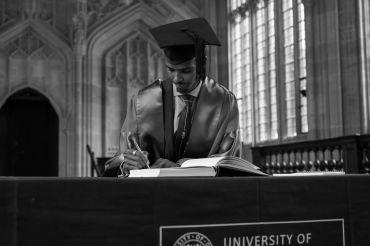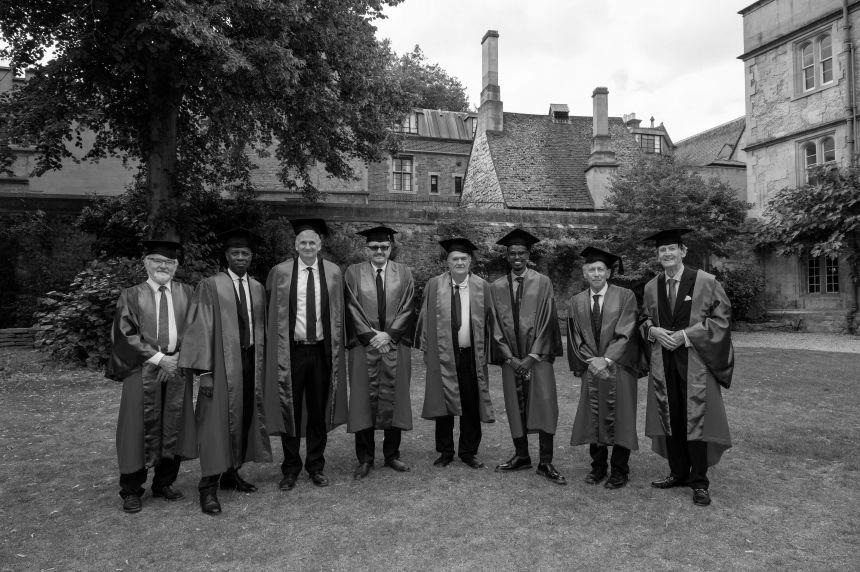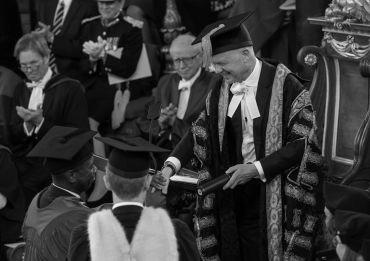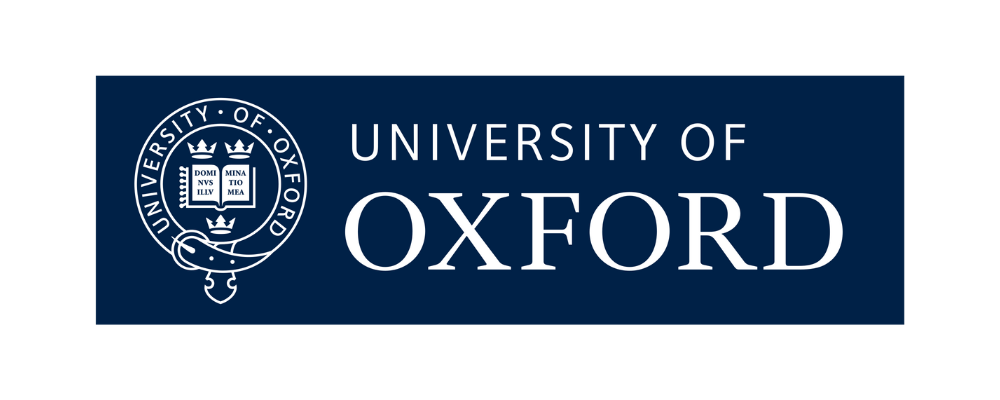On Wednesday 25 June, eight exceptional individuals whose achievements have made lasting contributions to the world were recognised at Oxford University’s Encaenia – an annual ceremony at which honorary degrees are conferred and the University’s benefactors are commemorated.
The day started with a Procession, including University dignitaries and the honorands in full academic dress, which made its way from Exeter College through Catte Street and the Bodleian Library quadrangle.
 Sir Mo Farah signing the Honorary Degrees Book.
Sir Mo Farah signing the Honorary Degrees Book.
Image: John Cairns/University of Oxford
The honorands then signed their names in the Honorary Degrees Book at the Divinity School before moving to the Sheldonian Theatre where the Encaenia ceremony has been held in some form since 1670.
During the ceremony, degrees were awarded to Sir Mo Farah, Professor Erwin Neher, Lord Melvyn Bragg, Clive Myrie, Professor Serhii Plokhii, Professor Timothy Snyder, Professor Colm Tóibín and Professor Robert S Langer.
Professor Irene Tracey CBE, FRS, FMedSci, Vice-Chancellor of Oxford University and Chair of the Committee on Honorary Degrees, said:
‘Encaenia is a highlight of Oxford’s academic year, offering us an opportunity to celebrate exceptional individuals whose achievements have shaped disciplines, made history and enriched society. Today, we honour eight people whose work has inspired, informed and transformed the world around us. This year’s distinguished honorands come from a remarkable array of fields, and through their vision, creativity and dedication, they have made lasting contributions. It is a privilege to recognise their accomplishments and to welcome them into the Oxford community.’
Honorands 2025
At Encaenia on Wednesday 25 June, degrees were awarded to:
Lord Melvyn Bragg, Broadcaster, author and parliamentarian
Lord Melvyn Bragg, CH, FRSL is a British broadcaster, author and parliamentarian. He was appointed a life peer in 1998, becoming Baron Bragg of Wigton in the County of Cumbria. In 1961, he joined the BBC as a trainee. Just a few years later he was appointed editor of BBC Two’s first arts programme, New Release. In 1978 Lord Bragg became the editor and presenter of The South Bank Show. From 1988 to 1998, he hosted BBC Radio 4’s Start the Week and now presents In Our Time (1998 to present). As an author, Lord Bragg has an extensive bibliography that includes award-winning fiction, non-fiction and several screenplays. He is a Fellow of the Royal Society of Literature and holds honorary fellowships from the British Academy and the Royal Society. In 2010, Lord Bragg received a BAFTA Fellowship.
Clive Myrie, Journalist and presenter
Clive Myrie is a British journalist, newsreader and presenter. He studied law but chose to pursue journalism and became a trainee at the BBC in the late 80s. Clive joined BBC network news in 1992 as a correspondent based in London, before his first overseas posting to Japan in 1996. He has gone on to cover major global events and report from war zones around the world. In 2009, Clive joined the BBC News Channel as a presenter, and is now one of the lead presenters of the 6 and 10 o’clock News on BBC 1. In 2021, he became host of Mastermind and Celebrity Mastermind. Clive has received numerous accolades including a number of awards from the Royal Television Society, a Peabody Award in 2017 and the 2018 David Bloom Award. Clive is a Pro Chancellor of the University of Bolton and Chancellor of the University of the Arts London. He is also a Fellow of the Royal Television Society.
 Degrees were awarded to Professor Erwin Neher, Clive Myrie, Professor Timothy Snyder, Professor Serhii Plokhii, Professor Colm Tóibín, Sir Mo Farah, Professor Robert S Langer and Lord Melvyn Bragg.
Degrees were awarded to Professor Erwin Neher, Clive Myrie, Professor Timothy Snyder, Professor Serhii Plokhii, Professor Colm Tóibín, Sir Mo Farah, Professor Robert S Langer and Lord Melvyn Bragg.
Image: John Cairns / University of Oxford
Professor Serhii Plokhii, Historian
Professor Serhii Plokhii is a historian and author, widely recognised for his scholarship on Eastern Europe. He is the Mykhailo S. Hrushevs’kyi Professor of Ukrainian History and director of the Ukrainian Research Institute at Harvard University. Professor Plokhii was born in the Soviet Union. He spent much of his early life in Ukraine. He earned his undergraduate degree in history and social sciences (1980) at Dnipropetrovsk University (now Oles Honchar Dnipro National University), where he went on to become a Professor. He later taught and conducted research at the University of Alberta in Canada, where he also served as the Associate Director of the Peter Jacyk Center for Ukrainian Historical Research and founded the research program on Religion and Culture at the Canadian Institute of Ukrainian Studies. He has published extensively, and his books have won numerous awards.
Professor Timothy Snyder, Historian
Professor Timothy Snyder is an American scholar of the history of Central Europe, Ukraine, the Soviet Union and the Holocaust. He holds the inaugural Chair in Modern European History, supported by the Temerty Endowment for Ukrainian Studies, at the University of Toronto, where he will begin teaching in the 2025-2026 academic year. He is also a permanent fellow at the Institute for Human Sciences in Vienna, and head of the academic advisory council of the Ukrainian History Global Initiative. Professor Snyder is the author or editor of 20 books published in 40 languages and writes for the press on Ukraine, the US, authoritarianism, digital politics, health and education.
 Clive Myrie receives his honorary degree from the Chancellor.
Clive Myrie receives his honorary degree from the Chancellor.
Image: John Cairns/University of Oxford
Professor Colm Tóibín, Writer, journalist and academic
Professor Colm Tóibín, FRSL is an Irish novelist, writer, journalist and academic. He currently serves as the Irene and Sidney B. Silverman Professor of the Humanities at Columbia University. Following his studies at University College Dublin, where he graduated in 1975 with a degree in English and History, Professor Tóibín moved to Barcelona; an experience that later informed several of his books. Upon returning to Ireland, he worked as a journalist. His debut novel, The South, was published in 1990. Professor Tóibín’s work has been widely recognised and shortlisted for the Booker Prize three times. His novel Brooklyn (2009) was also adapted into an Oscar-nominated film. Professor Tóibín is a Fellow of the Royal Society of Literature. He was appointed Laureate for Irish Fiction 2022-2024 and in 2023 was awarded the Bodley Medal.
Sir Mo Farah, Athlete, humanitarian and TV personality
Sir Mo Farah, CBE, is a British long-distance runner with multiple Olympic, World and European titles. Sir Mo was knighted in the 2017 New Year Honours for services to athletics. In 2010, Sir Mo made history by becoming the first British athlete to run the 5,000m in under 13 minutes. During the 2011 season, he became Britain’s first 5,000m world champion. At the London 2012 Olympics, Sir Mo won Great Britain’s first Olympic gold in the 10,000m. He completed the long-distance double by also taking the 5,000m title. Sir Mo secured his legacy at the 2016 Rio Olympics by again winning the 5,000m and 10,000m gold medals. From the track, Sir Mo transitioned onto roads and secured third place and a new British record at the 2018 London Marathon. He won the 2018 Chicago Marathon with a new European record. Sir Mo is a Save the Children Ambassador and National School Sport Champion for the Youth Sport Trust.
Professor Robert S Langer, Chemical engineer, nanotechnologist, biologist, scientist and entrepreneur
Professor Robert S Langer is an American chemical engineer, nanotechnologist, biologist, scientist and entrepreneur, known for his groundbreaking contributions to controlled drug delivery systems and tissue engineering, and is a cofounder of Moderna. Professor Langer is the David H. Koch Institute Professor at the Massachusetts Institute of Technology (MIT). He also served as Chairman of the United States Food and Drug Administration’s Science Board from 1999-2002. Professor Langer has written over 1,600 articles and is recognised as the most cited engineer in history. His patents have been licensed or sublicensed to over 400 companies. He has received more than 220 major awards, holds numerous honorary doctorates, including Harvard, Yale, Columbia and Northwestern, and has been elected to the US National Academy of Medicine, National Academy of Engineering, National Academy of Sciences and the National Academy of Inventors.
Professor Erwin Neher, Biophysicist
Professor Erwin Neher is a German biophysicist renowned for his pioneering work in cell physiology. He was jointly awarded the Nobel Prize in Physiology or Medicine 1991 alongside Professor Bert Sakmann ‘for their discoveries concerning the function of single ion channels in cells’. He is a Foreign Member of the Royal Society, an Honorary Fellow of the International Union of Physiological Sciences, Member of the German Academy of Sciences Leopoldina and an International Member of the US National Academy of Sciences. In addition to the Nobel Prize, the importance of Professor Neher’s work has been widely recognised including the Gottfried Wilhelm Leibniz Prize 1987, the highest honour awarded in German research.
Outstanding academic performance
Eight Oxford University students were also recognised for their outstanding academic performance during this year’s Encaenia ceremony:
- Adam Mee (St Catherine’s College) was awarded the Gibbs Prize for best overall performance in BA History of Art.
- Perpetua Haydn Taylor (New College) was awarded the Gibbs Prize for best performance in Modern Languages for best submitted work in Paper XII Special Subject and Paper XIV Dissertation; the Sir Thomas Blomefeld Prize for best FHS performance in French; and the Paget Toynbee Prize for best performance in Italian Paper IX.
- Benjamin Zelin (Trinity College) was awarded the Gibbs Prize for Materials; best performance in FHS (Final Honours School) Part I.
- Anubhab Ghosal (St Edmund Hall) was awarded the Gibbs Prize for FHS (Final Honours School) Mathematics Part C.
- Sarah Shah (Magdalen College) was awarded the Martin Wronker prize for Pre-Clinical Medicine; best performance in Final Honour School Medical Sciences.
- Rebecca Howitt (Queen’s College) was awarded the Meakins McClaran Medal for outstanding overall performance of a medical student undertaking the medicine course leading to the degrees of BM BCh (Oxon).
- Gabriel Leigh (Exeter College) was awarded the Lubbock Prize for best overall performance in the BA in Economics and Management; the Gibbs Prize for best performance in Economics papers in the BA in Economics and Management; the Gavin Cameron Memorial Prize for best performance in Econometrics (all Economics joint-schools); the John Hicks Foundation Prize for best performance in Microeconomics (Economics and Management candidates only); and the John Hicks Foundation Prize for best performance in Quantitative Economics (Economics and Management candidates only).
- Augustus Smith (All Souls College) was awarded the George Webb Medley Prize 2024 for best MPhil Economics thesis.
“The University of Oxford is a collegiate research university in Oxford, England. There is evidence of teaching as early as 1096, making it the oldest university in the English-speaking world and the world’s second-oldest university in continuous operation.”
Please visit the firm link to site


